The best backpacks for commuting and urban cycling in 2024
The best cycling backpacks can make the difference between arriving at your destination with your stuff safe and dry or soaking wet.
The best commuter bikes are bound to have racks or mounts for panniers. But the best hybrid bikes might not, and a cycling backpack is less hassle. A small bag can carry your essentials, while a larger one can fit in your laptop and a change of clothes.
If you’ve invested in one of the best electric bikes for the commute, you might need a sizeable backpack to carry your battery and charger. It isn’t wise to leave the best road cycling helmets locked to your bike, so consider if you can fit your lid in too.
Our expert testers have picked the best cycling backpacks on the market and put them through their paces.
We looked for backpacks with effective and dependable waterproofing or water resistance. This is perhaps the most important feature because if you’re cycling to work, even only on nice days, you’ll eventually get caught out by a freak rain storm.
On top of that, we looked for durable and easy-to-use closure systems, such as a roll-top or waterproof zips, and enough capacity to carry everything you’re likely to need on a daily basis.
Because this guide is geared mainly towards cycling backpacks for commuting and urban use, we’ve focused on hi-viz or reflective options. If those colours aren’t to your taste, many of them are also available in more muted tones.
Once you’ve worked your way through all of the reviews, keep reading for our buyer’s guide to cycling backpacks.
Best cycling backpacks in 2024
Camelbak Mule Commute 22L
- £120 as tested
- 22 litres
- Pros: Lightweight; weatherproof laptop sleeve
- Cons: Black only
Camelbak’s Mule Commute 22 is a lightweight, low-volume cycling backpack and a shrewd choice for the sprightly commuter.
The padded and weatherproof laptop section has a wraparound closure for added protection. There are also two zipped internal pockets.
The bag’s ‘weather-resistant’ outer has a clip for your helmet, comfortable raised pads to keep your back from overheating and three elasticated open pockets.
Two secure pockets on the bag’s arm straps make items easy to grab when the Mule Commute 22 is strapped to your back.
While the bag comes only in black, 360° reflective details will help you be seen at night and a light can be clipped on.
The bag is compatible with Camelbak’s reservoirs (not supplied).
Camelbak H.A.W.G. Commute 30

- £160 / $170 / €159.99 as tested
- 30 litres
- Pros: Big volume; great fit; stable and secure on the bike
- Cons: Only comes in black
The Camelbak H.A.W.G. Commute 30 is a technically excellent cycling backpack ideal for fast commuters who need to carry plenty.
The Commute 30’s tough Cordura outer is fully waterproof and has storm zips for all its compartments.
The main compartment can hold a full change of clothes and shoes and has a large, zipped pocket and a mesh pocket along with a document sleeve.
In the second compartment, there is a weatherproof 17-inch laptop sleeve and room for a hydration bladder (not included).
On the back of the Commute 30, you can attach a helmet and light while the side pockets can store a U-Lock and water bottle.
On the bike, the Commute 30 is brilliant, you can feel its origins as an off-road pack, its stable, supremely comfortable, and very adjustable.
On drop-bar bikes, you can stop the backpack from hitting the rear of your helmet.
The bag may be all-black, but it has good night-time visibility thanks to the two large reflective panels on its flanks along with reflective details on the rear and on the harness straps.
Lomo Hi-Viz Dry Bag
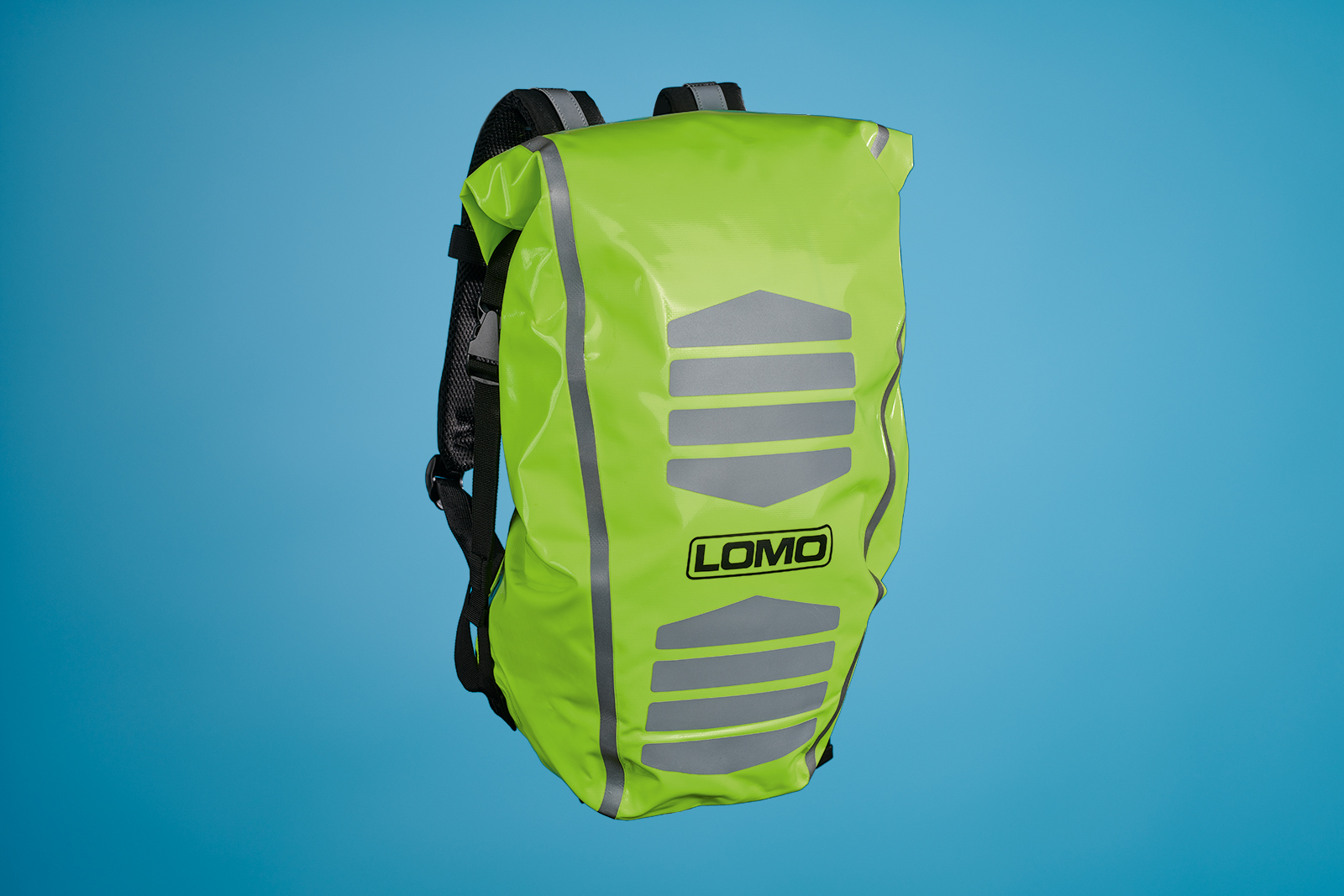
- £32.99 as tested
- 30 litres
- Pros: Spacious; waterproof; durable
- Cons: Little ventilation for your back
The Lomo Hi-Viz Dry Bag is big, tough, waterproof, bright, cheap and its hi-vis fluorescent yellow PVC is decked in reflective stripes.
So what are the downsides? Well, you’ll get a bit sweaty on longer rides or when carrying heavy kit, but this 30-litre PVC bag will swallow all your belongings and keep them bone dry, thanks to the roll-down top and welded seams.
It lacks any extras, but for under £40 we really aren’t complaining.
Osprey Transporter Roll
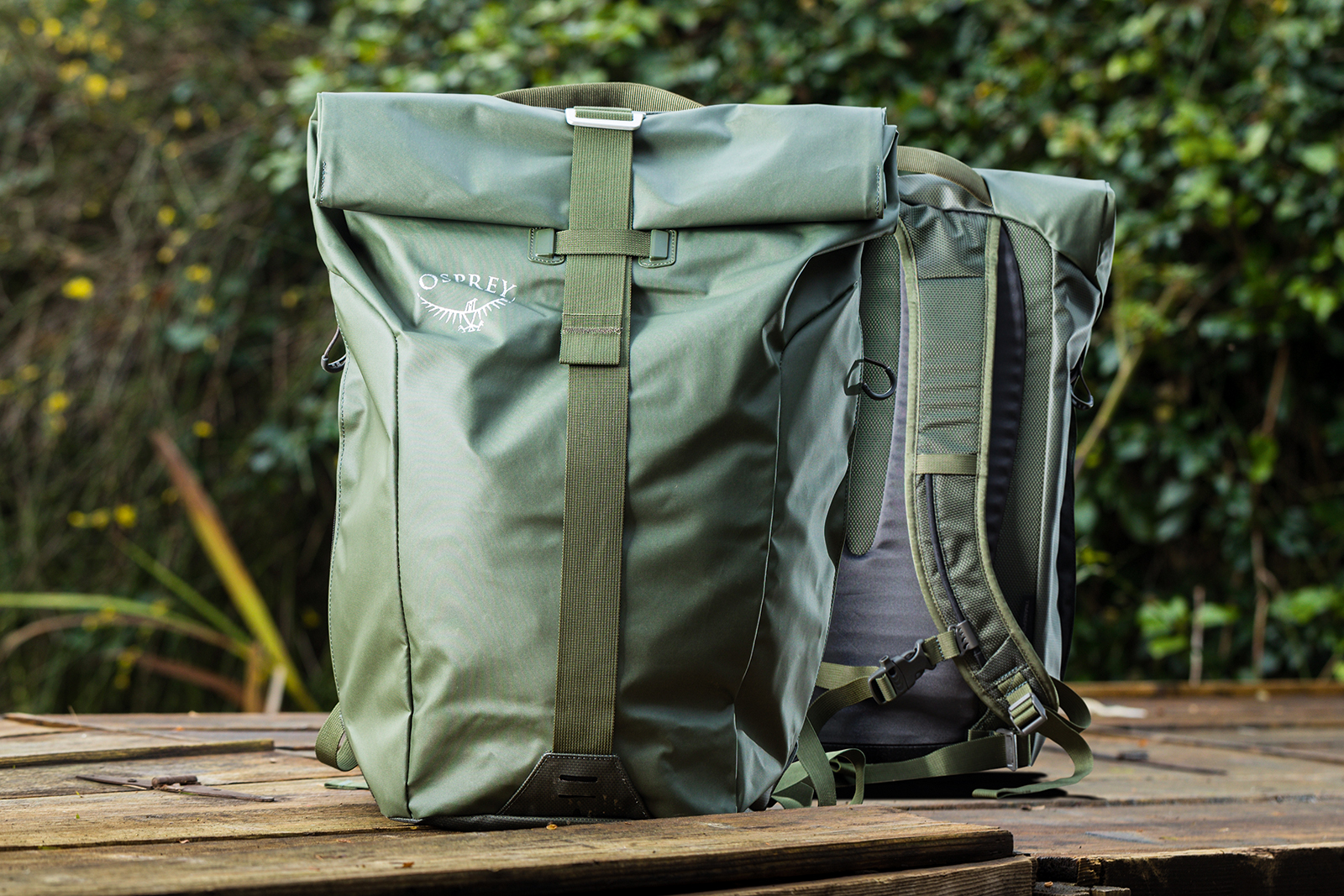
- £95 as tested
- 25 litres
- Pros: Comfortable; practical
- Cons: Not waterproof
The Osprey Transporter Roll is a smart-looking rucksack that is comfortable and practical, but not fully waterproof.
There is a large main compartment with an organiser section, laptop sleeve and mesh pockets. The roll-top design enables you to adjust capacity, increasing the 25-litre volume a bit or reducing it to stop belongings from moving around.
The back panel is secure and the shoulder straps are comfortable when you’re on the move.
Altura Thunderstorm City 30

- £79.99 as tested
- 30 litres
- Pros: well-ventilated; all-round visibility
- Cons: No exterior pockets
Altura’s Thunderstorm bag adds little reflective dashes all over the sides, back and bottom for highly effective, all-round visibility. If the hi-vis yellow version is a little too loud for you, it’s also available in black.
The 30-litre compartment has a laptop sleeve and two internal pockets, but the outside’s clean lines are completely pocket-free.
There’s a light loop, the roll-top is cinched with a metal buckle for effective waterproofing and the padding is well vented, which prevents sweat build-up.
Chrome Barrage Cargo 22X
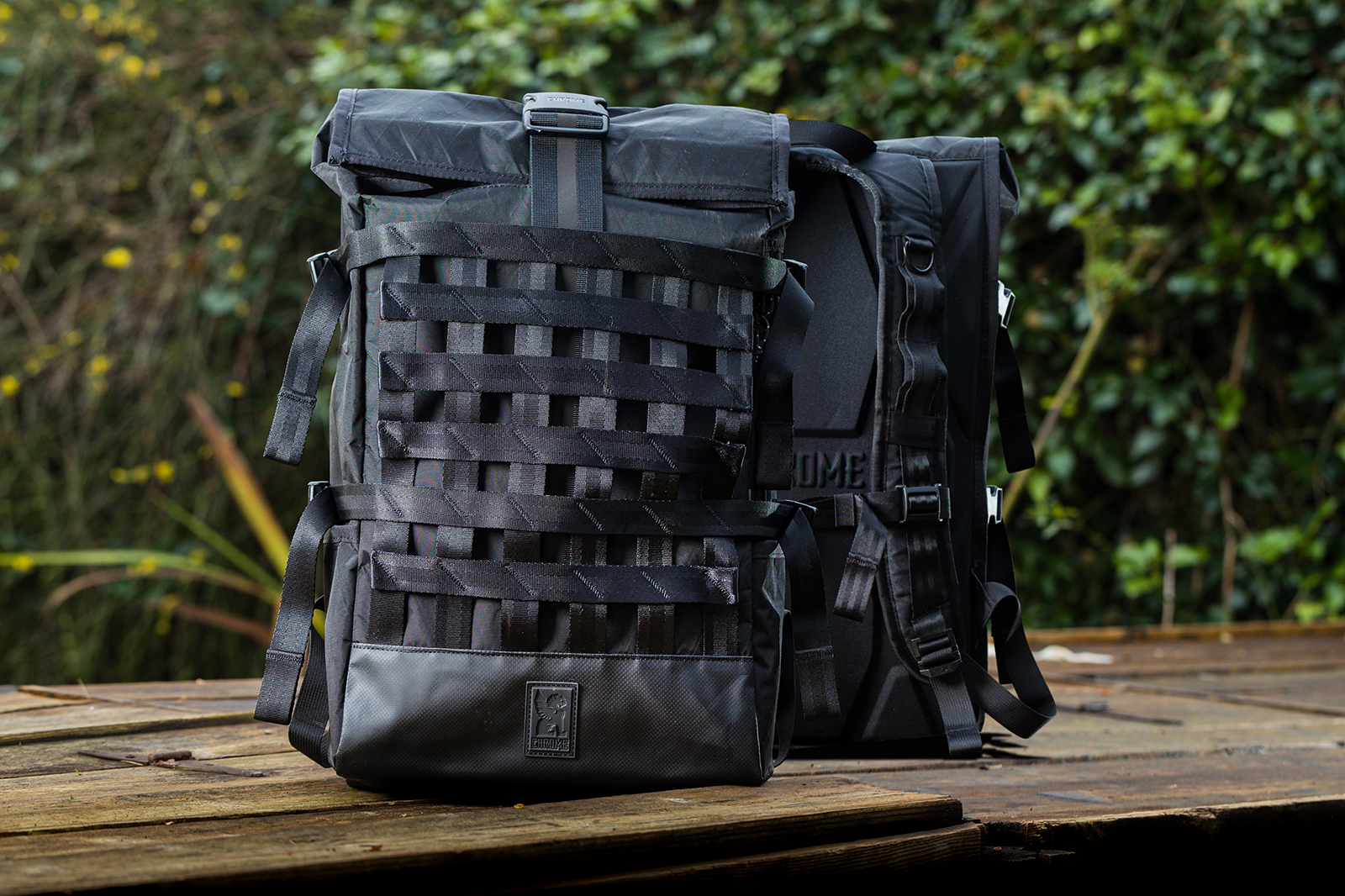
- £190 as tested
- 22 litres
- Pros: Waterproof; additional cargo net capacity
- Cons: Pricey
Chrome bags have a reputation for lasting a very long time, and the seriously constructed Barrage looks to continue that tradition.
The bag has a welded-seam waterproof tarpaulin liner and an abrasion-resistant exterior.
An exterior cargo net provides extra carrying potential.
The downside of the strength is the weight of this bag and it takes a few rides to wear in the straps.
Chrome Bravo 4.0

- £221 / $180 / €243 as tested
- 30 litres
- Pros: Exemplary construction and materials; cavernous capacity; adaptable; comfortable
- Cons: High price; short of tech features
The Chrome Bravo 4.0 is comfortable to wear, built to last and brilliantly simple.
Made from tough, fully recycled polyester, the Bravo 4.0 is backed up by a lifetime warranty. While not cheap, it should serve you for decades to come.
Its voluminous, main compartment shape makes packing plenty a breeze and the roll top does allow you to expand the capacity up to 35 litres. A full change of clothes, shoes, and a 15-inch laptop all fitted in with room to spare.
The additional compartment on the back has a padded laptop sleeve, zippers on its flanks to open a third compartment, and a zippered phone pocket too.
On the back, cargo straps can secure a helmet or a lock. Two side pockets can hold for water bottles.
While riding in any position, the Bravo 4.0 shouldn’t clash with your helmet unless almost full.
The harness straps are broad and well-padded, and the securing sternum strap has 15cm of vertical adjustment making it a good fit for both male and female torsos.
The padded back panel lets cooling air flow between your back and the bag.
Evoc Commute Pro 22

- £225 / $280 / €260 as tested
- 22L
- Pros: Secure fit for all body shapes; compact size; certified protection built-in
- Cons: Expensive; rain protection comes at an extra cost
The Evoc Commute Pro 22 is a classy and compact commuter backpack with built-in protection albeit at a rather high price.
Its 22-litre capacity can fit a change of clothes, shoes, laptop, phone, and a lock.
The main compartment has a full-length zippered flap for easy to pack and unpack, e dual stretch pockets and a third stretch pocket large enough for a toiletries bag, or even a light pair of shoes.
Sitting behind the main compartment is a padded laptop section (up to 17-inch) with a side zip.
The heavy Cordura outer is tough and reasonably weather-resistant. Evoc does sell a rain cover for the bag separately, but on a bag costing £225 this should be included.
Crash protection comes from the Liteshield Plus, a system certified to the higher level of lightweight back protection for motorcyclists, to help protect your spine if you crash.
The Commute Pro 22’s back padding is also well ventilated.
The padded harness straps are well shaped, and the adjustable sternum stability strap should fit most body shapes. A removable waist strap offers more stability and security when the bag is fully loaded.
On the back, the bag has lots of subtle reflective print and the zipper pulls have reflective lace loops.
Elops Speed 100

- £30 as tested
- 20 litres
- Pros: Affordable; good usability
- Cons: No zipped pockets; limited protection for laptops
If you’re new to cycle commuting, the Elops Speed 100 is a good backpack option thanks to its low price and durability.
While the rucksack has a nominal capacity of 20 litres, the roll-top design means that can be extended a touch.
The light grey interior is a nice touch, helping you spot things when staring into the backpack.
It would be nice to have zipped internal and external pockets for valuables.
Mission Workshop Speedwell
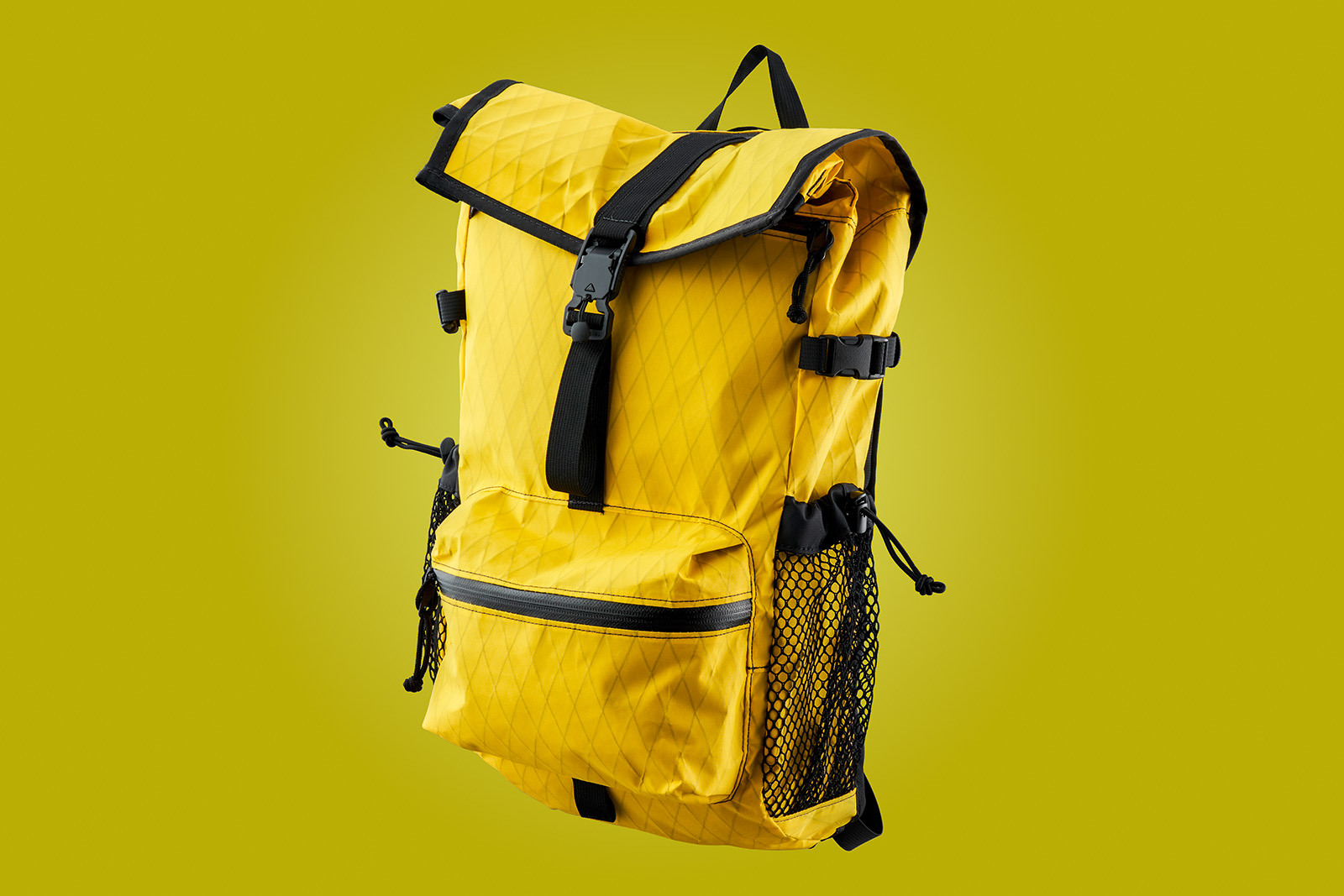
- £305 / $335 / €420 / AU$580 as tested
- 20 litres
- Pros: Durable; waterproof
- Cons: Heavy (but you don’t necessarily feel it)
The Mission Workshop Speedwell is a tough and waterproof backpack, thanks to its combination of X-Pac and MultiCam Cordura fabric.
The backpack can fit a hydration bladder, as you’d find in hydration packs, and has room for a 16in laptop.
The design of the Speedwell makes it highly versatile, with our tester using it for commuting, gravel riding and hiking.
The floating harness provides airflow while keeping the backpack stable. There are chest and waist straps to help customise the fit.
The bag’s robustness does come at a 1.29kg weight, but the comfort means it doesn’t feel heavy.
Ortlieb Atrack CR Urban

- £185 / $260 / €190 as tested
- 25 litres
- Pros: Secure; waterproof
- Cons: High price
The atrack CR Urban is a high-quality, sustainably made rucksack from a leader in bike luggage, Ortlieb.
The 45-litre bag uses waterproof fabric and has well-placed back and hip padding. This helps avoid having the watertight zip dig into you, which is placed on the back of the rucksack.
Ortlieb has incorporated lots of features, including a daisy chain of attachment points on the outside, alongside stretch mesh side pockets.
The price is a significant outlay, but you’ll likely end up using this bag for more than your daily commute.
Osprey Radial

- £150 / $195 / €195 / AU$299.95 as tested
- 26-34 litres
- Pros: Well equipped; well made
- Cons: Bulky
The Osprey Radial is a substantial cycling backpack that can carry a lot. Undoing an internal zip extends the 26-litre capacity to 34l.
The adjustable mesh back makes space between you and the back panel, helping you avoid the dreaded sweaty back.
The hi-vis rain cover stows away in the base. A separate internal pocket can hold shoes away from the well-cushioned laptop and document sleeves.
Details such as plenty of pockets and a helmet clip are useful, but they add to the weight, bulk and price.
Oxford Aqua V20

- £54.99 / $64.95 as tested
- 20 litres
- Pros: Available in lots of different colours; excellent waterproofing
- Cons: Can leave you sweaty
The Aqua has a simple design – an effective roll-top opening into a single 20-litre compartment – but it’s available in loads of colours, all of which have extensive reflective details with 360-degree visibility.
With the top tightened, it proved impervious to water, with even the external pocket waterproof.
The bag is tough and easy to clean too, although it may leave you a little sweatier than some. It’s bright, straightforward and well-priced.
Proviz Reflect360

- £69.99 as tested
- 30 litres
- Pros: Well-proportioned; high visibility
- Cons: Water resistant rather than waterproof
The Proviz Reflect360 bag is grey but glows like the moon when light is shined on it, thanks to millions of reflective beads. A bike light can be strapped onto the front.
Inside, the laptop sleeve doesn’t fully close, but a large mesh pocket and a couple of smaller ones zip shut. The main compartment is roomy.
Outside, mesh pockets on either side are on the small side. A more spacious zipped front pocket will fit your phone, wallet and more.
The bag’s body is water resistant rather than waterproof (the zips are waterproof, however).
Thule Paramount

- £150 / $195.95 / €179.95 / AU$349.95 as tested
- 27 litres
- Pros: Durable; rain cover included
- Cons: Heavy
The Thule 27L Paramount is a well-crafted commuter backpack full of cycling-specific features.
These include the frontal opening for a bike lock and helmet, an enclosed hi-vis rain cover, stash areas for bottles and a covered eyewear/valuables compartment at the top.
The laptop area is sizeable and reinforced, and the main compartment has lots of room.
Thanks to comfortable straps and a breathable, supportive mesh back area, the Paramount is fine for short/mid-range commutes. However, the 1.43kg weight might rule it out of longer adventures.
Vaude ExCycling Pack

- £120 as tested
- 40 litres
- Pros: Highly organised; rain cover
- Cons: Shape can obstruct vision when looking over shoulder
With a high-volume, the Vaude ExCycling Pack provides plenty of room for belongings. It isn’t just a cavernous bag, though. There is a laptop sleeve, which can be accessed externally, and mesh organiser sections.
A rain cover helps to keep things dry. There is a water-repellent treatment should you get caught in a shower before you have time to unroll the cover.
The bag is well constructed from environmentally and ethically sourced materials, according to Vaude.
Our tester’s only gripe was the wide and square shape obstructed the view when looking over their shoulder.
Also consider…
These bags scored fewer than four stars in our test, but are still worth considering.
Altura Grid Backpack
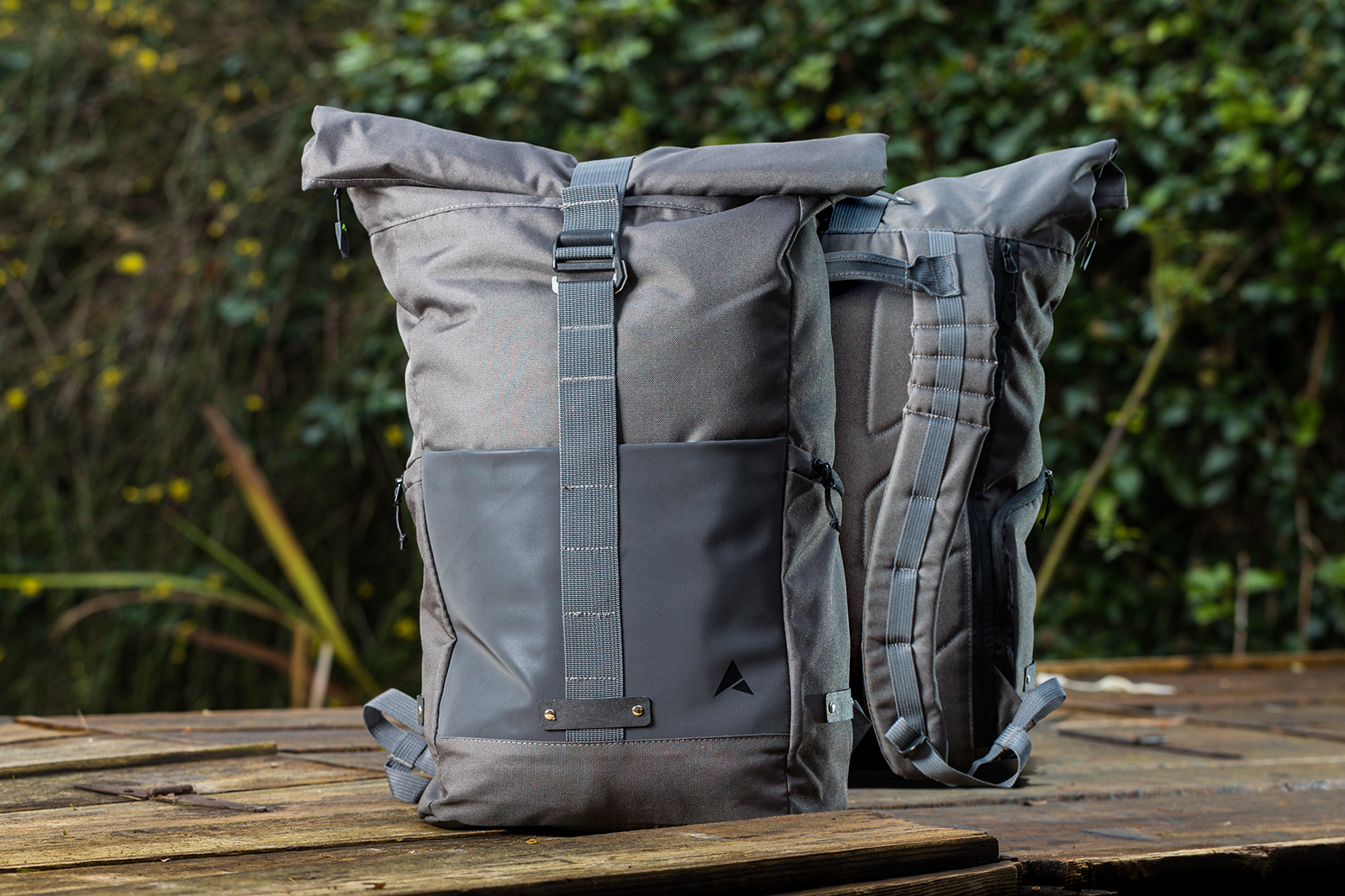
- £60 / $74 / €66 / AU$97 as tested
- 25 litres
- Pros: Storage space without bulk
- Cons: Not waterproof
For one of the lightest cycling rucksacks, at 578g, the Altura Grid Backpack is not short of outer or inner pockets, and has a laptop sleeve.
The roll-top can be zipped to keep contents – probably nothing more than day-to-day work items – secure.
But the Grid isn’t made from particularly technical materials, so it’s only water resistant and not the most hardy.
Altura Grid Travel

- £70 / €80 as tested
- 20 litres
- Pros: Backpack and briefcase in one; clever design; lots of features; great looks
- Cons: Not waterproof; less sturdy than some
Being a cycling backpack and briefcase in one, the Altura Grid Travel is ideal for short-distance urban riding.
Costing significantly less than most of its rivals, the Grid is versatile, stylish, and full of features. The back is comfortably padded and ventilated too.
But it’s not suited to longer, cross-country commutes: the Grid’s coating is only water-repellent and isn’t the hardest-wearing bag we’ve tested.
You can easily turn the compact backpack into a soft, stylish briefcase replete with twin briefcase handles on its flank.
The main compartment holds a change of clothes, shoes, toiletries, and a 15 inch laptop.
A second compartment, sandwiched between the main compartment and the back pad, splits into two parts. They are large enough to carry a 15-inch laptop and iPad while separating them with a padded divider.
On the back of the Grid, there is a full dark grey reflective panel with another slim storage compartment and a zip to secure a large U-Lock.
The soft touch harness straps are removable and offer plenty of vertical adjustment. But there is no sternum strap for stabilising heavier loads.
Ogio No Drag Mach LT

- £109.99 / $149.99 as tested
- 24 litres
- Pros: Shaped to suit riding in a fast position; quality construction
- Cons: Fit won’t suit all body types; women may struggle for a comfortable position; not very reflective
The Ogio No Drag Mach LT will appeal to drop-bar commuters who prioritise speed, comfort and stability in a cycling backpack over outright practicality.
Ogio has designed the No Drag Mach LT to sit lower down the back than most bags while enhancing the outside’s aerodynamics. The back panel is padded and ventilated.
You can adjust the height of the harness straps. A sternum strap stops the bag moving laterally. However, the No Drag Mach LT may be too tight around the chest for some commuters.
The main compartment just about holds a full change of clothes and shoes. A second compartment stores a laptop (up to 15 inch). At the top of the bag, there is a zipped pocket for your phone, a zipped mesh bag for glasses and a carabiner for a keyring.
The outer has no means to attach a light, lock or bottle. Neither is it very reflective or waterproof in prolonged rain: the zips eventually soak through, and the main body gets damp. On the plus side, the contents of the bag remained dry.
Ortlieb Commuter Daypack Urban Line

- £155 / $225 / €159.99 as tested
- 21 litres
- Pros: Tough construction; lots of good details
- Cons: High price
Roll down the top of this high-quality PVC-free 21-litre bag and it will keep the dirt and rain out. It also has reflective stitching for night-riding safety.
Features include a light, D-lock loops and a padded laptop sleeve. The German-made PU-laminated Cordura and cotton blend bag has a reinforced base, comfortable back pads and adjustable, removable chest and waist straps for maximum versatility.
It’s a fantastic bag… at a price.
Rapha Roll Top Backpack
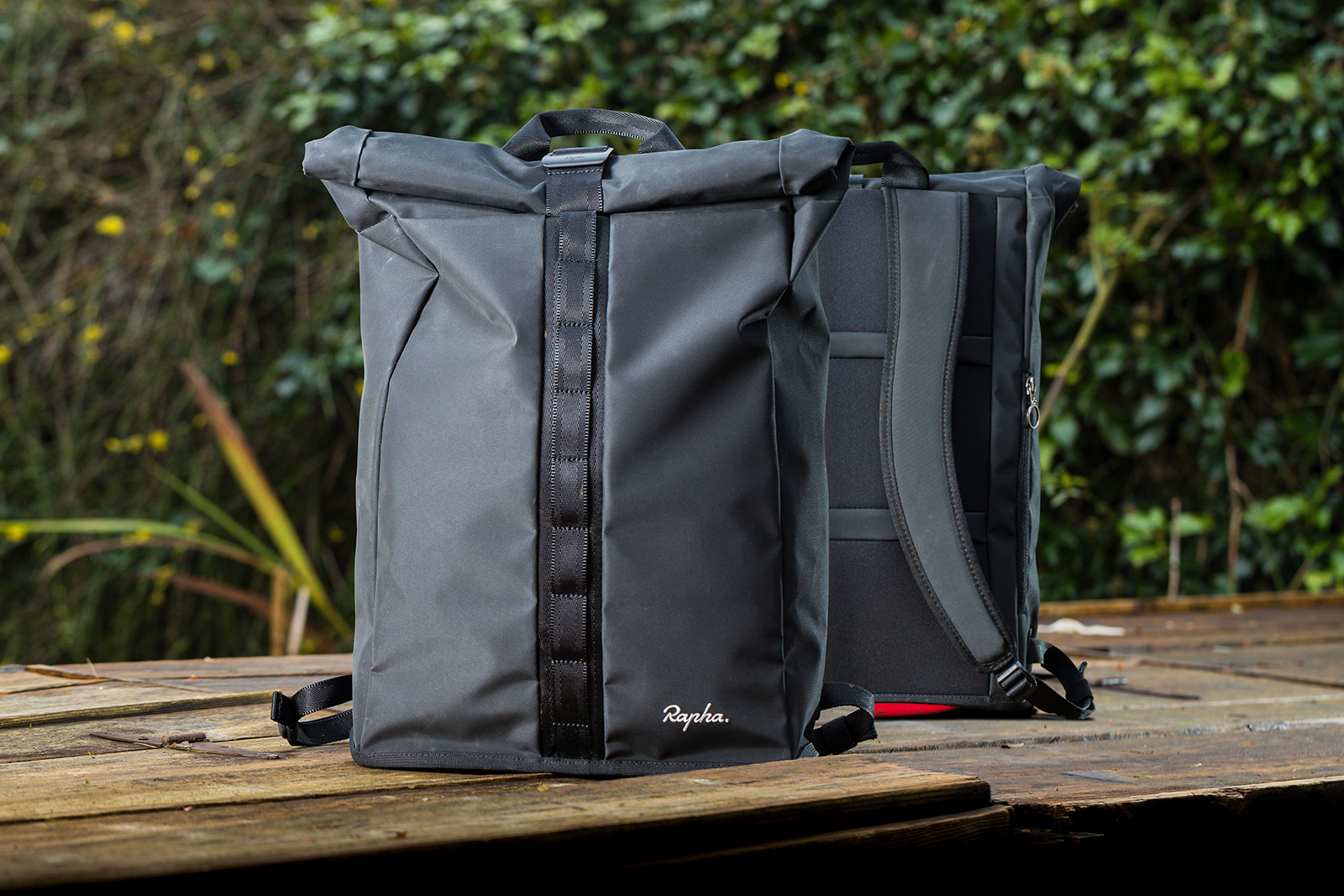
- £100 / $135 / €120 / AU$175 as tested
- Pros: Looks good on- and off-bike
- Cons: Poor comfort
The Rapha Roll Top belies its sleek design to incorporate handy commuting features. Made from water- and scratch-resistant fabric, the bag has divided internal pockets and a reflective base panel.
You can hook your bike lock through loops down the front of the bag, rather than take up space inside.
The Roll Top isn’t really suitable for longer commutes, however, because if you’re carrying a laptop it will press against your back through the sleeve.
dhb Waterproof Rucksack 25L
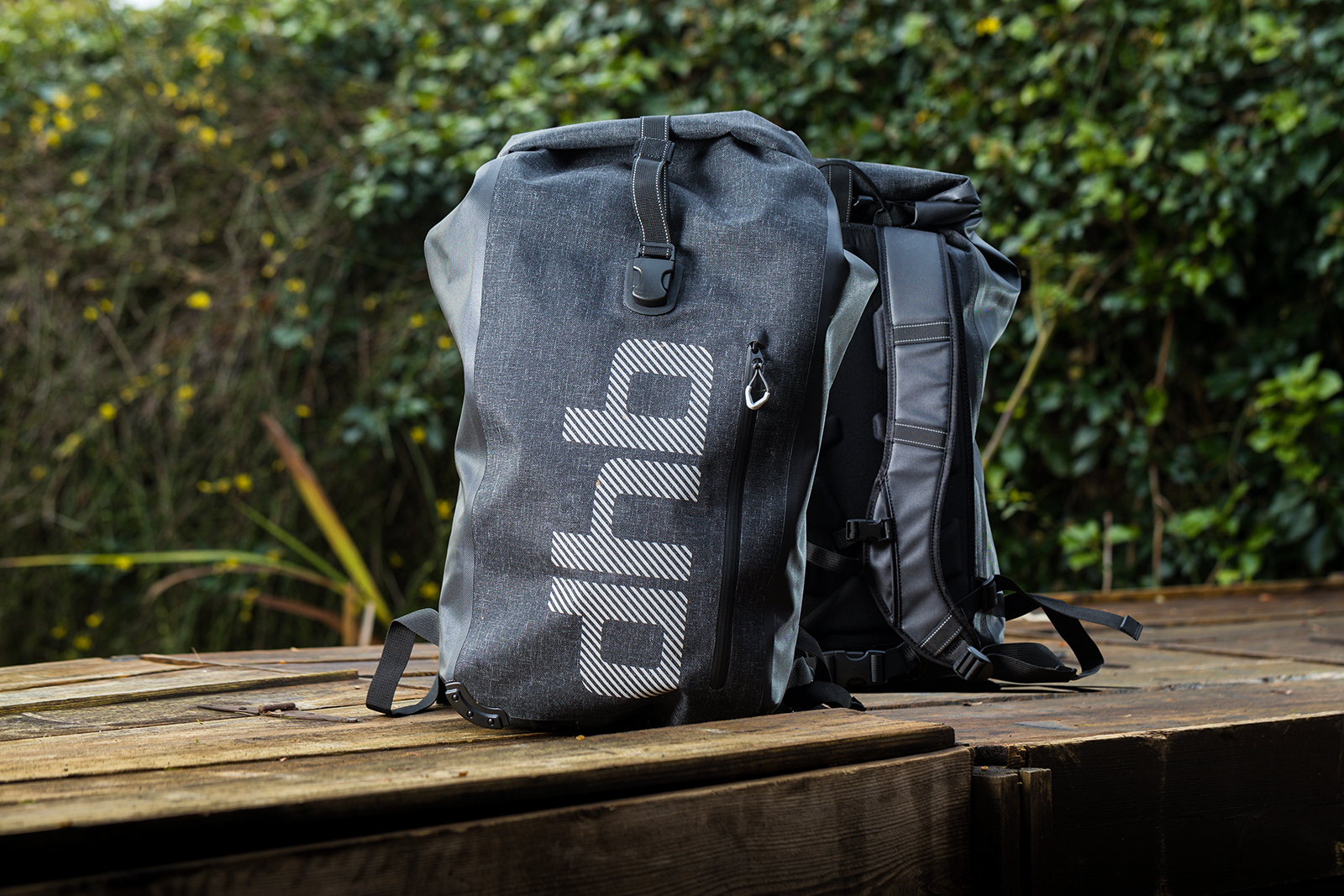
- £50 as tested
- 25 litres
- Pros: Waterproof
- Cons: Our tester struggled with comfort
The dhb Waterproof Rucksack has sealed seams and a watertight zip to make it completely waterproof.
The construction is durable and the large size made packing straightforward. While there’s no dedicated laptop sleeve, the waterproof design eases the water-ingress nerves.
The rucksack felt bulky and lumpy on the back, despite adjusting the straps. But this might be a compromise you’re willing to make for the sake of keeping your possessions dry.
Why you can trust BikeRadar
BikeRadar has been an authority on bikes and cycling tech since its inception in 2007, delivering the world’s best riding advice.
We have experts testing all types of bikes, parts, clothing and accessories, from road, mountain and gravel bikes to commuting, bikepacking and electric bikes.
Our reviews are always editorially independent – with no exceptions. Our reviewers comprehensively test all products in the real world, always reflecting on performance, value and the wider market when delivering their verdicts and review ratings.
We have more than 15,000 product reviews available at your fingertips, as well as expert buying, maintenance, training, skills, health and fitness advice.
Our annual Bike of the Year test is an industry benchmark and the BikeRadar team consists of some of the most experienced riders and testers in the business.
Buyer’s guide to cycling backpacks
Do you really need a cycling-specific backpack?

It depends. If you’re just looking to pop out for sunny pootles around your local park, then you’ll probably be fine with any old backpack.
Just watch out for unexpected showers and think about lining your bag with a bin liner if you’ve got anything in there you don’t want to get wet.
Those who cycle regularly or on mucky roads, though, will almost certainly appreciate the extra features cycling-specific backpacks offer. These usually include waterproofing, vented rear padding, increased visibility and mounts for locks and lights.
Backpack vs panniers
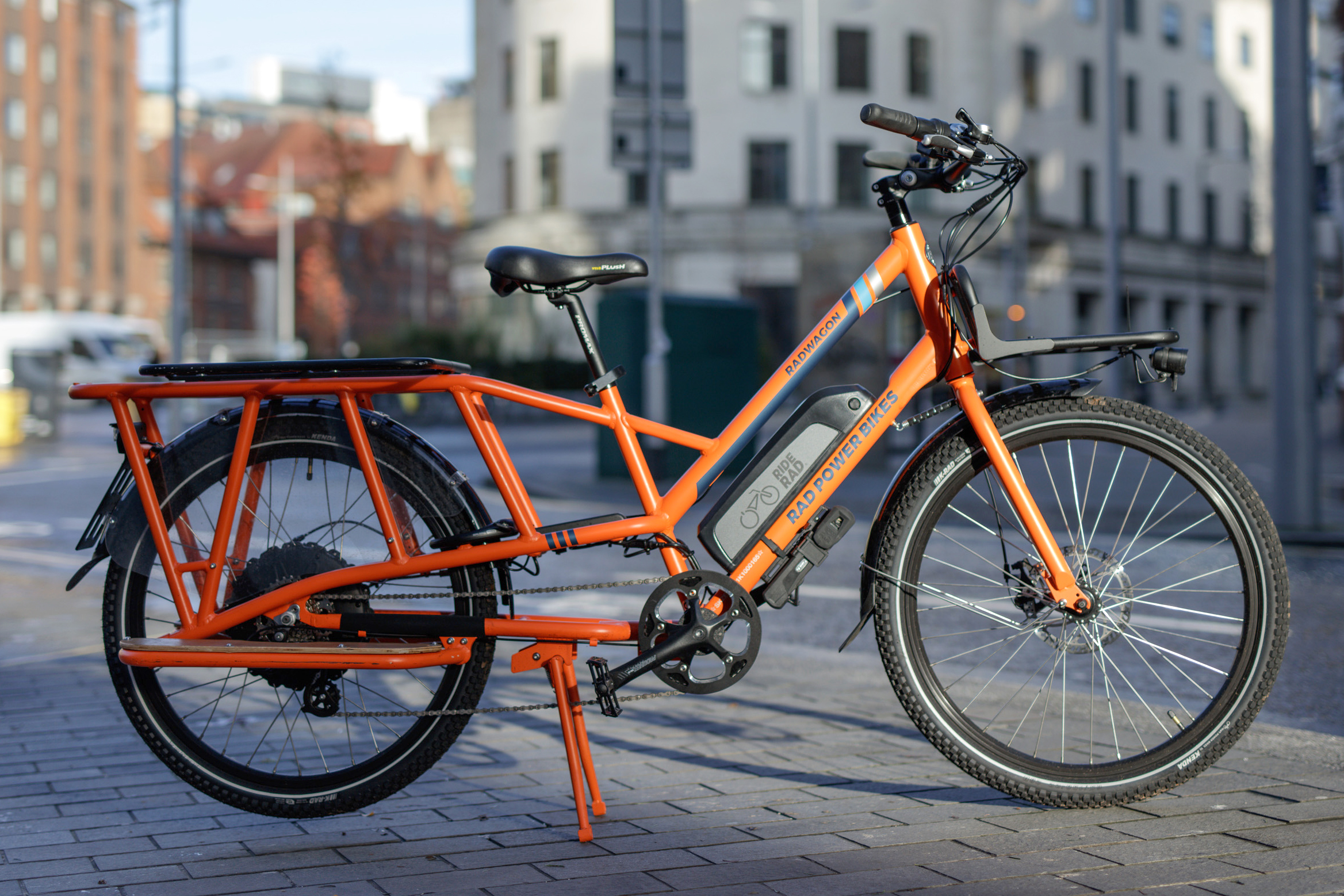
When deciding between the best bike bags for commuting, you typically have two choices: a backpack or a pannier bag.
Most people riding short distances and carrying reasonably light loads are likely to be better off with a backpack rather than panniers.
The simplicity and take-anywhere nature of a backpack is hard to beat. A cycling backpack can also usually be pressed into double duty as a backpack for hiking or city use.
Panniers are great for touring, or for cyclists who want to carry larger or heavier loads, such as shopping, but you’ll need to install a rack on your bike (assuming it has the requisite mounts), and they’re usually more cumbersome to carry when off the bike.
If you’re looking to transport really big loads, such as children or work equipment, you might even want to consider a cargo or electric bike.
Zips vs roll-top

Roll-top bags are usually what you see professional cycle couriers using, and for good reason. Zips are compact and flexible for shaping, but can be a weak point for waterproofing, and are also much more likely to wear out and break with heavy use.
A roll-top bag, on the other hand, can be opened/closed hundreds, if not thousands, of times without any major wear and tear. For this reason, many bags will use a combination of zipped pockets and roll-top main compartments. This helps maximise both durability and the convenience of having separate pockets for specific items.
How much capacity do you need?

The majority of commuters carrying items such as a laptop, some spare clothes and valuables will generally need around 20 to 30 litres of space. Aspiring pro bike messengers might need up to 40 litres, but that’s probably overkill for most people.
Those who commute during the winter will need a little more room for carrying bulkier jackets and the like.
Likewise, if you commute in bib shorts and a jersey with clipless pedals and cycling shoes, you’ll probably want to change into something else at the end of the journey. Don’t forget to factor in extra space for a change of clothes and shoes.
All things considered, it’s probably best to have a little more room than you think you’ll need – it’s always going to be useful to have enough space to be able to pop to the shops on the way home.
More ways to carry your gear

If a cycling backpack isn’t the right way for you to carry your possessions, an alternative is using bikepacking bags.
These bags typically attach to your bike with Velcro straps and can provide as much – or more – capacity.
Check out our guides to frame bags, handlebar bags and the best bikepacking saddle bags to find out more.